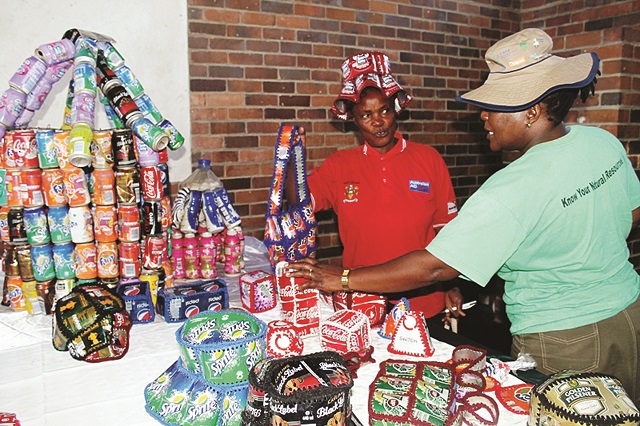Women turn waste into wealth

Sukulwenkosi Dube-Matutu, Plumtree Correspondent
WHILE many disregard rubbish and rush to dispose of it, some women in Plumtree have ventured into waste management projects in order to sustain their families and to maintain hygiene in their community.
They have formed health clubs where they collect waste and recycle it into different wares, which they sell to raise income.
Some of the waste they recycle include cardboard boxes, empty mealie meal bags, bottles, drink cans and pieces of cloth, which would have been dumped.
They produce hats, mats, caps, sanitary wear, artefacts for decoration, bags, washing baskets and learning material for Early Childhood Development pupils among other things.
Members of health clubs from Plumtree recently commemorated Africa Environment Day, which was organised by the Environmental Management Authority (Ema) where they displayed their wares and also educated members of the public on the advantages of waste management.
Mrs Miriam Moyo, a member of Simidzilani Health Club, said the waste management project had assisted her to fend for her family. She said they formed the club in 2015.
“As a club we collect cardboard boxes, pieces of cloth, empty drink cans, plastic bottles and clothing items from the rubbish dump. We recycle this rubbish to produce different products. We produce hats, caps, bags, washing baskets, mats, sanitary wear, artefacts for decoration and learning material for Early Childhood Development learners among other things.
“We sell these wares to residents, motorists and schools. These products range from 0.50 cents up to $10 depending on what customers buy,” said Mrs Moyo.
She said the money she made through recycling waste helped her to buy food supplies and groceries for her family.
Mrs Moyo said she was encouraged to recycle waste during a training programme that was held under the Water and Sanitation Hygiene (Wash) Programme. She said they were educated on the importance of hygiene and how to make products using waste.
She said they were trained on how to make a few products but as a club they used their imagination and innovation to broaden their scope.
“While many look at rubbish and continue to disregard it and rush to dispose of it I see it as a source of livelihood. I may not be able to earn a lot of money through selling these products but I’m able to put food on the table for my family,” she said.
Mrs Khethiwe Ngwenya who is also a member of Simidzilani Health Club said recycling was not only about raising income but it also promoted hygiene in the border town.
She said they constantly conducted clean up campaigns in the border town in order to promote hygiene.
“When we collect waste our focus isn’t only on raising income or ensuring we have a source of livelihood but it also ensures that our town is clean. We don’t only collect rubbish from the dumpsite but we also hold clean up campaigns in the town.
“During these campaigns we are able to collect waste for recycling and at the same time ensure that the town is clean. This project that we have embarked on has made us realise that there is no waste which is useless,” she said.
Mrs Ngwenya, however, said they faced challenges in accessing markets for their products. This, she said, discouraged some women from participating in the clubs.
She said only a few residents were aware of their products as they sold their wares from their homes. She said there was a need for more fairs to be organised to help them market their products.
“As health clubs our main focus is to promote and be pioneers of hygiene and we do this through various activities. It is our desire that more women join us and be part of these clubs.
“If our town is dirty then it means we will putting the lives of our families, especially our children at risk of contracting diseases. If more people join in this initiative we will realise the benefits of recycling to full capacity,” said Mrs Ngwenya.
Ema held the belated Africa Environment Day commemoration at Dingumuzi Community Hall in Plumtree. To mark the day the environmental agency spearheaded a cleanup campaign in the border town.
Speaking during the commemorations Environmental Education and Publicity Officer for Matabeleland South Province, Mrs Sithembokuhle Moyo said this year’s Africa Environment Day was celebrated under the theme “Empowering communities through sustainable waste management”.
She said the theme sought to ensure that communities recycled waste for sustenance.
“It is the responsibility of every resident to ensure that their town is clean and this is only possible through waste management. It’s not only about throwing away rubbish but recycling it is equally important.
“Women from Plumtree have formed health clubs which have contributed immensely in ensuring hygiene is maintained. They have gone a step further from collecting waste only but they recycle, reuse and recover. It’s, however, not the responsibility of women only to recycle but men have to be actively involved as well,” said Mrs Sithembokuhle Moyo.
She said in towns where health clubs had embarked on waste management there had been significant progress in ensuring that they remained clean.
“Plumtree Town has improved in terms of cleanliness when compared to previous years and health clubs have significantly contributed towards this success. Another town, which has made significant progress is Gwanda, as it has similar clubs that are engaged in waste management,” she said.
Mrs Sithembokuhle Moyo said community members were expected to carry out livelihood sustaining activities that were not harmful to the environment.
She, however, raised a concern over the state of littering on highways and laybys in Matabeleland South Province. She said there was a need for travellers and motorists to exercise hygiene and take responsibility in maintaining cleanliness.
Africa Environment Day was established by the then Organisation of African Unity in 2002 as a way of raising awareness on the pressing environmental challenges facing the continent. Since 2012 the Africa Environment Day has been celebrated on March 3 in conjunction with Wangari Maathai Day, in order to pay tribute to the late Nobel’s Laureate’s green legacy.
@DubeMatutu











Comments